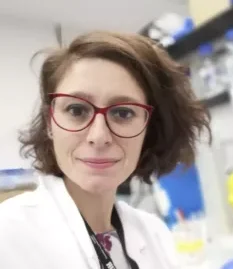From the Eyes of the Researcher
Dr Esposito and her team published findings from their John Goldman Fellowship research project into the use of forskolin in the treatment of a particular type of acute myeloid leukaemia (AML).

Dr Esposito’s research focuses on the function of protein phosphatases in leukaemia – these are enzymes which remove phosphate groups from proteins and regulate almost every cellular process — growth, division, metabolism, signalling, stress response. One of the protein phosphatases Dr Esposito’s group is working on is called PP2A and it is known to act as a tumour suppressor.
In other words, PP2A regulates the survival and growth of our cells and prevents them from becoming cancerous cells – in its normal function.
Previous research conducted by the group and others indicated that PP2A might not function properly in cancer cells and leukemic cells, and that this malfunction could contribute to their survival. On the contrary, stimulating or re-activating PP2A could help to stop the growth of cancer cells and leukemic cells.
In this study, funded by Leukaemia UK, Dr Esposito and her team investigated the expression of PP2A genes in over 300 acute myeloid leukaemia patients and the efficacy of an herbal medicine called forskolin in lab models of leukaemia.
She explained: “Our results show that the expression of PP2A is not homogeneous among acute myeloid leukaemia patients; we found that in patients with an aggressive acute myeloid leukaemia called KMT2A- rearranged AML, the expression is lower than a AML subtypes, identified as “favourable prognostic group” as patients belonging to this group respond better to chemotherapy. We also discovered that forskolin halts the growth of these aggressive leukemic cells and increases the response to standard chemotherapy.”
Forskolin is a natural product with anti-cancer properties. Dr Esposito’s team were interested following the publication of a few studies published by other research teams indicating that forskolin could activate PP2A. Dr Esposito said “These findings and the low reported toxicity prompted us to investigate its effect on AML leukemic models.”
The team ran several experiments to figure out how forskolin works. They found that some of its effects rely on activating a protein called PP2A, while others happen through different pathways. For instance, the way forskolin helps switch off certain cancer-related genes depends on PP2A, but its ability to make chemotherapy more effective does not. Instead, that benefit comes from blocking a “drug efflux pump”—a kind of molecular pump that normally pushes chemotherapy drugs out of leukemic cells. By blocking this pump, forskolin helps the chemotherapy stay inside the cancer cells longer, so it can have a stronger toxic effect.
When asked what the significance of this study is Dr Esposito explained: “we now know that forskolin can be used to kill leukemic cells, and that it could be used to improve the response to standard chemotherapy. This means that it could be potentially used to lower doses of chemotherapy and reduce the side effects often associated with the intensive AML treatments.”
What’s next for this study?
These studies have shown that PP2A plays an important role in helping KMT2A-rearranged leukemic cells survive. Because PP2A itself is tightly controlled in the body, more basic research is needed to figure out how we can boost its activity against cancer cells without harming healthy ones, and to learn which other AML subtypes might also benefit from a PP2A-based treatment strategy.
Forskolin, a herbal medicine with relatively low toxicity, has been tested in clinical trials for obesity and asthma, although the results were inconclusive. One challenge is that forskolin is not water-soluble, which makes it unsuitable for giving to patients by mouth or through an IV. A water-soluble form, called colforsin vaporate, does exist and has been tested in a pre-clinical model of high-grade serous ovarian cancer by another lab. This makes it a promising candidate for further testing in leukaemia models.
At the same time, Dr. Esposito and her team are still working to understand exactly how forskolin works at the molecular level. This knowledge will be crucial to separate its desired effects—killing leukemic cells—from any possible side effects.

Dr Maria Teresa in the lab

